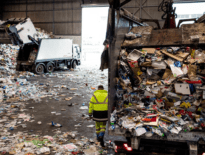By Neil Seldman, Institute for Local Self-Reliance, and
Dan Knapp, Urban Ore, Inc.*
We all want to conquer the problems of air, water and soil pollution from plastic waste. But to do this, should communities cede control over the recycling industry to the same large corporations who are responsible for designing and promoting the waste-generating products and packages?
The Break Free from Plastic Pollution Act sponsored by well-meaning Democrats is well intended, but it will come to naught if the petrochemical/plastic industry is put in charge. These industries have fought against all attempts at the local, state and federal levels to curb their profligacy.
Many parts of the Bill are critically needed. It would be a shame to let the good be undermined by the bad, as happened in California in 2020.
What we need NOW is money flowing to cities and counties to rebuild and right-size recycling infrastructure from the debacle created by Big Waste corporations. Big Waste introduced the sloppy single stream recycling system that caused China in 2013 — called Operation Green Fence — to warn us that they intended soon to stop importing recycled materials from the US. They enforced the policy — called National Sword — at the end of 2017, thus throwing Big Waste recycling and the cities that relied on them into turmoil. It was already doing poorly, with unrecyclable residues as high as 30% of incoming volumes. [1]
Recycling in the US is making a remarkable comeback as cities take control of collection, and newly invigorated entrepreneurs find ways to compete for supply. States are investing heavily in secondary manufacturing capacity. Both state and local levels of government are passing new minimum-content requirements; unit pricing for garbage disposal; product and packaging bans; landfill bans on recyclable and compostable materials; buy recycle campaigns; Right to Repair laws, municipal reuse schemes; and industrial parks for recycling processors and manufacturers. Governments are placing surcharges on wasting, and taxes on hard-to-recycle packaging such as hybrid plastics. Private industry is matching public investment by investing massive amounts in US paper, plastic and electronic scrap processing and recycling.[2] In Berkeley, California, new companies are providing reusable takeout food ware in response to local bans of single use plastics. Other companies are expanding reuse and repair enterprises.
But what we are getting from the producing companies is a loud and frantic ‘bum’s rush’ for Extended Producer Responsibility. Putting recycling under the control of the “producers” obscures the fact that the intent of the EPR concept of ‘polluter pays’ has become the policy of ‘polluter controls’.
Everyone agrees that these companies should be responsible for financing the expanded infrastructure. It does not follow that they should be responsible for making the rules. EPR has become a weaponized ideology hiding the vested interests of the largest corporations in the world. Chaz Miller, environmental industry analyst, calls this ‘monopoly EPR’.[3] Artificial government mandates, argues one paper industry analyst, should not be allowed to interrupt an efficient market that is recycling 66% of discarded paper in the U.S. and 70% in Canada. “EPR would take a wrecking ball to the market forces that drive the success of the U.S. paper recycling enterprise, and for no purpose.” [4] U.S. pulp and packaging producers have committed to investing an additional $4.1 billion in manufacturing infrastructure between 2019 and 2023.
Discard management has been an ‘out of sight, out of mind phenomenon for years. The public has been at the mercy of trade journals and general media, which do not distinguish between contrasting forms of EPR. EPR for hard-to-recycle and dangerous materials has worked reasonably well after government action curbed industry loopholes. But EPR for containers and paper products already enjoys some 50,000 private companies working nationwide; tens of thousands of government programs; and 1 million workers doing the necessary heavy lifting.
Worse yet are the webinars put on by industry and some misinformed environmental groups that purposefully obscure the nuances of policy, refuse to allow for dialogue, and fail to address the disastrous performance of the only system in the world — British Columbia, Canada — that has placed “nonprofit” stewards totally in charge of recycling. These systemic and well-documented problems include reliance on incineration, attacks on the province’s bottle bill and the businesses that it helped build, non-transparency in how the “stewards” handle money taken from “producers,” favoritism in awarding contracts, and crony capitalism.[5] The Canadian West Coast Refuse & Recycling Coalition (WCRRC), reported that product redesign by producers in British Columbia are “few in number and anecdotal at best.” Furthermore, manufacturers simply pass on the costs of EPR to their customers as a cost of doing business.” The report further notes that advocates have looked to export the British Columbia EPR model to all three West Coast states to increase recycling and encourage manufacturers to use more recyclable packaging. But the “WCRRC exposes numerous flaws and shortcomings with BC’s EPR Model for packaging.” The report also “documents a lack of transparency, which makes it nearly impossible to evaluate the program’s true cost, effectiveness or recycling rates. BC’s EPR model has failed to achieve significant environmental milestones.[6]
The Break Free from Plastic Pollution Act has critically important provisions that reflect the goals of Zero Waste and the American peoples’ desire for relief from wasting. Good parts of the legislation include: a moratorium on virgin plastic manufacturing; a national bottle bill; minimum recycled content requirements; and a ban on single use plastic food ware.
Perhaps most compelling is the elevation of environmental and racial justice to a core policy principle. The latter forms the bedrock of the foundation for a rational approach to wasting in our consumer driven economy. The cleanest materials come from labor-intensive businesses that treat their workers fairly and pay a living wage. EPR’s answer to environmental justice is more automation, more incineration, more capital tied up in Rube Goldberg contraptions that don’t work.
There is bad with the good. Very bad. The Bill includes a form of EPR that turns over the entire US recycling system to the petrochemical and plastic industries. The bill has provisions for “advisory councils” with an ultimate appeal for redress to the Environmental Protection Agency. This is an agency that has historically been subject to regulatory capture by industry and buffeted by intense well-financed lobbying and use of the airwaves that overwhelms the public. EPR advocates naively or cynically point out that by giving JUST 51% control over producer company non-profit stewardship organizations, the public will be protected.
Most critically, organized citizens and small businesses will be stripped of their main weapon against Big Waste and “stewards:” the vote at the local level. Without the vote at the local level, activists could not have defeated over 400 incinerators since the 1980s. Right now, the anti incineration movement is revving up once again to defeat plans for new plastics incinerators that will dot the country if Covanta, Monsanto, and Dow get their way.
Low-grade plastics have been declared a hazard. Indeed they are. That is why the emerging industry to remanufacture products is important. At the same time as these companies are emerging, their supply chain will be burned in pyrolysis incinerators. EPR will not only allow this to happen, it will regulate so that it will happen. EPR is the end game for independent municipal recycling, composting and reuse enterprises. It also sounding the death knell for the anti incineration movement.
The majority of the Bill calls for creating an ‘organization’ composed of companies making the products. They will develop a plan, make the rules – with the force of law – and implement the plan to reach a certain level of recovery of some materials. There does not appear to be any penalty in their not reaching those goals, and experience where EPR is in control suggests there will be little or no data available to evaluate performance. The controls over the companies lie in ‘advisory boards’, which do not have the power to stop bad ideas and programs.
This is happening now in British Columbia, the only jurisdiction in the world that for 15 years has had the monopoly EPR program that the Bill is calling for. Things are going well in British Columbia only if you read the reports from EPR evangelists. In fact, BC’s Ministry of the Environment has created a ‘Soviet-like’ central control economy with no relation to markets or civic realities. It is the opposite of a transparent system and has amassed unaccounted for slush funds. There is little improvement in recycling levels. An outright attack on the bottle bill system and its independent businesses is underway.
What we need instead of EPR is money flowing to the traditional recycling system. This system– built painstakingly for the past 50 years by organized grass roots efforts — is already recovering from the single stream-recycling debacle that led to the recycling import ban by China in 2017. Recycling is coming back better than ever under local government and small business control. There is no need for China or Big Waste.
Producer EPR is not the way to move forward. This EPR is the ideology of manufacturers trying to take advantage of the very real crises they helped create: climate warming, plastic waste and deterioration of air, water and soil resources. This EPR is a hostile takeover of the existing recycling system and the privatization of state-controlled bottle bills.[7]
Recommendations:
There are two clear options that must be considered:
- Scrap EPR from the Break Free from Plastic Pollution Act. Right now, it is a rider on an otherwise well-intentioned effort. Build out full service resource recovery parks everywhere there used to be landfills. Even build such facilities on top of closed landfills if necessary. Table the discussion of how to use EPR, pending more deliberation. Carefully wade through the fog of misinformation and EPR propaganda that hides the facts. Then, as one leading backer of the Bill suggested, simply proceed with passing the good parts of the bill described above. Add surcharges and packaging taxes, and a mechanism to ensure the money will flow to the places where it is needed: to local governments, which have the authority, responsibility and capacity to proceed.Many European nations have adopted significant landfilling fees of $20 to $40 per ton that are used to fund recycling programs and decrease greenhouse gases. In the U.S., New Jersey and Pennsylvania and Alameda County and San Jose, California have adopted disposal surcharges. Several cities have passed product fees like the District of Columbia’s 5-cent fee on plastic shopping bags.Taxes on packaging and surcharges on incineration and landfilling counterbalance the negative environmental and human health costs of those systems that are borne by the public. They also level the playing field and provide needed infrastructure funds for safer and more sustainable alternatives.
- Replace monopoly stewardship EPR with municipal reimbursement in the Bill. Because the disposal service fee money flows to government rather than unaccountable opaque organizations, municipal reimbursement retains all the rights of citizens to advise and vote on local decisions. The producers pay into a government agency, which then distributes the funds to local governments for investment in infrastructure, training, and administration. Together with surcharges and packaging taxes, reimbursement could create a permanent stream of revenue for solid waste and recycling management. This is exactly the relief that our cities and counties need.After due consideration and dialogue, municipal reimbursement has been recognized as a proper use of the ‘polluter pays’ principle. Traditional environmental organizations like the Sierra Club, environment justice organizations, the Global Anti Incineration Alliance, Energy Justice Network, and the National Recycling Coalition are all supportive of this approach.[8]
The US recycling movement is surging forward. The comeback is better than ever.
Look at the television ads. Many manufacturing companies are bragging about their ‘new’ investments in 100% recycled packaging. They have been forced to make this decision by people as voting citizens and consumers who are using this dual power. This is the very power that the producers are now planning and lobbying to take away with monopoly steward EPR.
History shows that the Big Waste industry stepped in to cap recycling at 35% for 15 years. (It has recently fallen to 32%.) EPR is the end game: no more local rules. No more citizens voting on decisions that will affect their own cities.
That unintended consequences of producer controlled EPR is a mediocre recycling system, more incineration and toxic pollution, and little opportunity for community based enterprises. The nation will pay a lot of money to some of the richest corporations in the history of the world to fail at controlling plastic production and pollution.
———–
* ILSR is a research, technical assistance and policy organization focused on decentralizing the US economy through Zero Waste. Urban Ore is a full-scale materials management company, which arose from the Berkeley, CA landfill in San Francisco Bay. ILSR and Urban Ore have been working partners for over 40 years.
[1] https://ilsr.org/report-explores-problem-of-corporate-concentration-in-americas-waste-and-recycling-sectors/
[2] See, Recycling Comes Back, ILSR.org/recycle
[3] See, EPR in American EPR: Monopolies and Other Unintended Consequences, Waste 360, April 8, 2021,
[4] See, Kathi Rowzie, If it Ain’t Broke, Don’t Fix It: The Lifecycle of Paper is Already Circular, TwoSides, March 24, 2021.
[5] See, https://ilsr.org/york-universitys-studies-of-extended-producer-responsibility-reveal-evidence-of-failures/; and, https://ilsr.org/british-columbia-recycling-ends-pilot-program-beer-containers/; and, https://ilsr.org/critiques-of-different-approaches-to-extended-producer-responsibility-in-canada/.
[6] https://www.waste360.com/plastics/wcrrc-releases-study-british-columbia-s-epr-system-packaging.
[7] For a discussion of ‘inclusive EPR’ see soon to be released report by Taylor Cass Talbot, Women In Informal Employment: Globalizing Organizing, WIEGO.
[8] See EPR policy statements form GAIA, Sierra Club; and, NRC letter of endorsement for the policy letter to the Biden Harris Administration; and, https://ilsr.org/letter-to-biden-harris-administration-recycling-is-infrastructure-too/. Also see, https://ilsr.org/new-federal-legislation-presents-the-opportunity-to-break-free-from-plastic-pollution/
Photo credit: iStock





